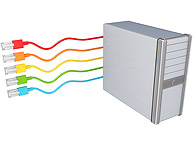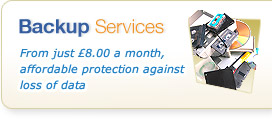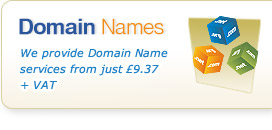Public Cloud. Private Cloud. What is it about?
20th March 2014

It's a good question - and one that comes up regularly. In this blog, we take a look at the advantages and disadvantages that they all offer. There are lots of attractive offers from companies (such as ourselves of course!) who offer cloud computing services such as e-mail, data storage or virtual machines available through the internet, but Small Businesses need to understand the difference between public and private cloud technologies before they make the decision of which to choose.
Public Cloud Services
Public cloud services include all kinds of services such as Amazon Web Services or Google Compute. Public cloud services are offered to users via the internet. They're generally available to multiple "customers" who all use the same shared infrastructure. When you use public cloud services, you are putting your data into someone else's hands.
This can have consequences - some which will increasingly become an issue. For example, the USA Patriot act grants the US government access to any data stored in the US. The 'extra-territorial jurisdiction' doctrine suggests that even EU Cloud providers can be subject to the law when they transfer data to the US. Some businesses already are not allowed to store data outside the UK or EU.
The recent revelations from whistle blowers such as Edward Snowden demonstrate that our data is not safe. All businesses have sensitive data and it makes sense to keep this data in the hands of local managed services providers as opposed to huge multinationals who have little concern over your data security. You might think that this isn't a concern for you, but in reality, if a Small Business was to find its customer data leaked, it could well spell the end for them - reputations are hard to acquire and very easy to lose.
It's also worth considering that many "public cloud" services come with 'best effort' service level agreements (and are often unrealistically "cheap"). This can lead to outages and downtime, with you unable to access your data or customers unable to access your website, losing sales or vital time for client projects and services. When you're thinking about using Cloud Services you need to consider this since you'll have little say in getting operational again when there are issues and you're unlikely to matter to the provider enough to be "prioritised" (and it's unlikely they can anyhow since it's all shared)
Beyond the generic "cloud computing" services, there are Cloud-Based Services. These are specific "services" offered using generic cloud concepts - rather than raw computing capability to run servers for your own purposes. Some argue that even services such as Netflix are "cloud" because they use larger public cloud providers to operate. The majority of the well known services aren't aimed at businesses (although you can often - technically if not legally, use them) and are really "consumer" style services that are "OK" for use in some small businesses. Alternatively they're "light" intros to bigger and better services - a sort of "loss leader" as it were.
We tend to consider these "Public Cloud" as they're "mass market" cloud computing and services - and they're often used by very small businesses that are starting up, have incredibly limited budgets. They do have a place, and can be useful, but often they'll leave you with a sub-standard set of services, functionality and so forth.
Larger businesses though can often use these for specific tasks - for example some industries use Public Cloud to boost capacity during peak periods of the year, or as a disaster recovery "backup" option - or where they have periods of need for lots of computing power - more affordably delivered by "renting" short term access. In most cases if you want "long term" or "always" access, Public Cloud tends to be less affordable - costs scale just as fast as computing power!
Specific & Tailored Cloud Services
The terminology is a little vague, but beyond the "mass market" Cloud Services that tend to get lots of attention an which are generally tailored at the consumer and prosumer markets, there are more specific, tailored offerings. For example, our own Agility Desktop and Agility Mail services - designed specifically for Small Businesses and designed around the needs of those businesses. Tailored cloud services tend to be a little less "generic" and "global" and are normally run by companies within your area or country. They'll typically offer a different type of feature to mass-market Public Cloud and as a rule, tend to have better standards of service, availability and so on.
These are really services where the benefit to you isn't in having raw compute power - as with generic Cloud Computing, but instead are giving you functionality and capability that would be prohibitively expensive for small businesses before - or where you'd have to use a lower specified, or otherwise limited version & setup. The basic concept is that you get better functionality and capability because the service provider has more scale and hosting facilities - more of everything than you - so can take advantage to offer richer features, lower costs and so on than a directly equivalent setup done yourself. That's why more tailored services are used by smaller businesses - they don't want to run servers themselves, but they want the power of the technology that can be delivered.
For many Small Businesses it can make sense to use some of the more tailored and specific Cloud Services offered to provide some functionality and facilities to the business. Commonly we find customers take our Agility Mail service - it gives you all the bells and whistles of e-mail - such as support for phones, tablets and so on, but without needing to run servers. It's "business grade" by design, making it ultimately cheaper and more effective than in-house e-mail services once the true cost of ownership are considered. Beyond this, many customers then use some Private Cloud services (see below) and ultimately end up with what we'd call a "Hybrid" environment - the best of both worlds as it were.
Private Cloud Services
Private cloud is another vague collection of ideas. In principle, Private Cloud services provide many of the advantages found in Public Cloud services - typically virtualising your environment using physical resources that are stored in a data centre or on your own premises. The difference between the two, however, is that the cloud is only available to the organisation that commissioned it. You can sometimes buy "Private Cloud" capabilities from "Public Cloud" providers - just to make life more confusing. The principle though is that the company provides you with a ring fenced, in theory protecting the customer and giving dedicated resources and security.
Typically, private cloud also offers highly levels of security. This makes it more suitable for businesses where there is a need to use, store and control access to private data or carry out more sensitive online tasks. For example, a legal firm should ideally use private cloud to ensure that it meets the appropriate levels of compliance around data security.
If you use "Private Cloud" in the context of running your own servers "in house" - rather than through a Hosting/Cloud provider such as ourselves, you're losing some benefits, but gaining others. In reality, in these scenarios you're enabling yourself to harness some of the most useful benefits of cloud technology & virtualisation - without relinquishing control of your data. It gives you more "control" at the expense of more administrative & maintenance cost.
For some well managed and maintained installations, reliability can be a key advantage of choosing private cloud services - you're masters of your own destiny. In reality the likelihood is that you'll need professional support to make things work well.
Which brings us to Hybrid...
In the real world the choices made depend on the organisation, connectivity, security needs and much more. It's very often the case that a mix of options works best. For example, here are some scenarios we frequently encounter:
Small Businesses - starting up, or with fewer than 10 users - traditionally took "Small Business" servers, now use Cloud Technology for E-Mail, Desktop Applications, Backups, Storage - the works. In our technology, this is based around our Agility Mail & Agility Desktop platforms.
Medium Businesses and those in specific professions - for example Accountancy - are more likely to have a Hybrid installation - often using Cloud provided E-Mail Services (Agility Mail), with in-house servers to look after specific tasks - normally bespoke or specific software - particularly if there is a sensitivity issue with data, and then use services such as our Cloud Small Business Backup to securely replicate data for disaster recovery purposes.
Larger businesses - and those with much more strict data retention or security needs might choose Private Cloud - multiple servers, using virtualisation technology, so they have some flexibility, speed and reliability controls, but without handing over control of the data. If the need is "power" and not "security" so much, they might use Public Cloud computing services to augment existing capability.
Of course there are exceptions - sometimes larger companies - especially those with distributed offices and locations find using our specific Cloud Services a perfect fit for them, and dispense with any in-house technology. Others find that they'll have us provide a managed, but private server farm - a private cloud hosted by a cloud provider a better match. And of course there are times where even very small companies find hybrid installations make more sense.
Confused?
Sadly we're not surprised. There are plenty of technology terms, vague words that have multiple meanings and so on which can leave you confused or making poor decisions which impact your business. We recommend you speak to specialists like ours at VPW - we'll help you find the right choices that are based around what your business needs - whether that's Cloud or On-Premises, Private, Public or even Hybrid. We focus on your needs and help match the choices to you - we're not against or for any method so our recommendations and guidance are truly based on the right option for you.
The important thing is to work with people who know what they're doing and can get you the right solution - regardless of the name, label or method of delivery.
Want to know more?
Just give our team a call on 01392 950 950, we'd be happy to discuss your options and help you demystify the terminology and instead focus on making your business easier and stronger. You can also browse our Cloud & Hosted Technology section or view our other Products & Services.




